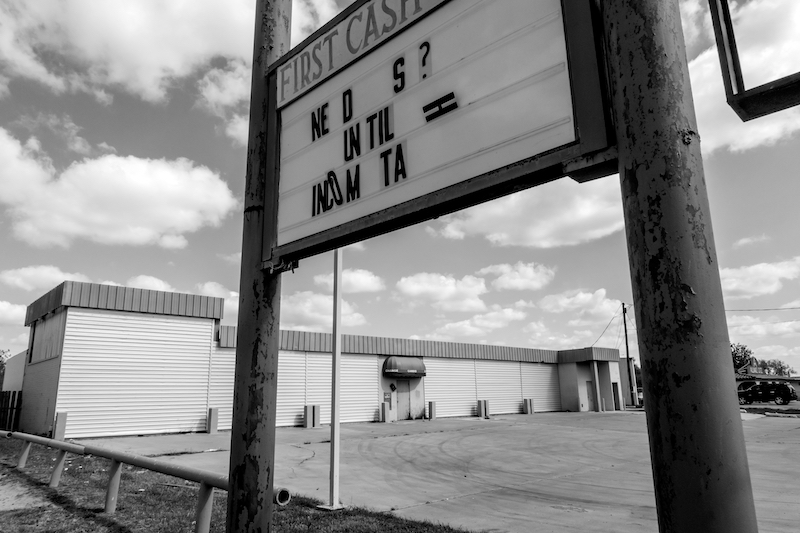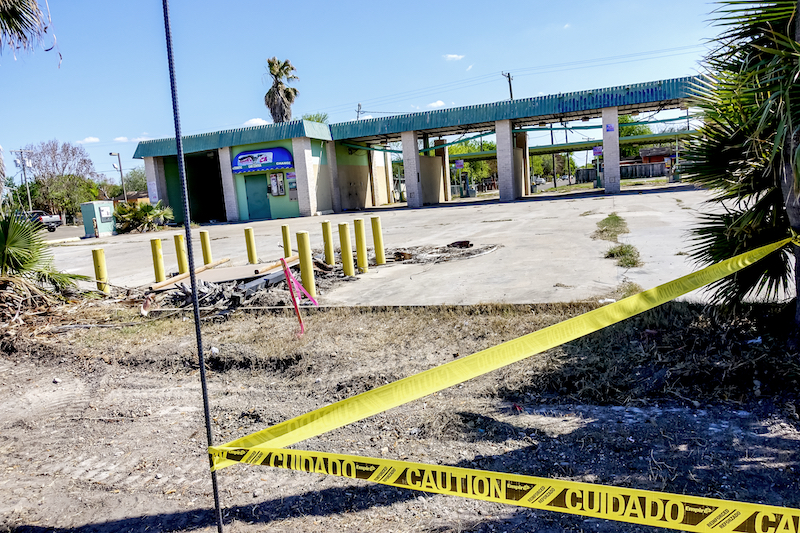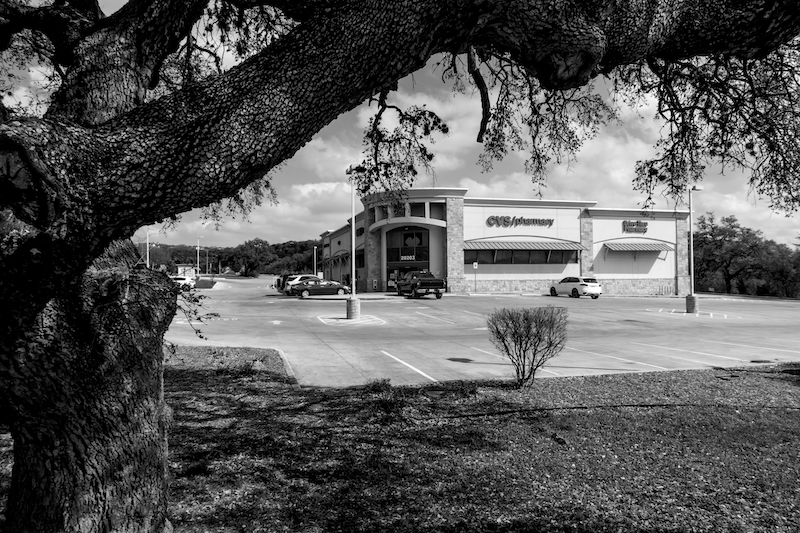Follow The Money - Part 1
"Mica" for Borderland Beat
 |
| In McAllen’s northern reaches is a home San Antonio prosecutors forfeited as part of their investigation into former Tamaulipas governor Yarrington Ruvalcaba |
Luis Carlos Castillo Cervantes’ nickname, “El Dragón,” makes him sound like a ruthless drug trafficker. His alias’ roots, however, are in the fairly mundane business he was known for in Mexico: He had the country’s exclusive license to lease a popular brand of road paving equipment. The machines, which scrape up and shred old asphalt as they pave roads, belch dark clouds of smoke. Hence, “El Dragón,” “the Dragon,” or “the King of Dragons,” as he’s also known.
Castillo built his business empire by being generous, including sending politicians duffel bags full of cash. Working with state governments in Mexico, Castillo seemed to find it almost impossible to do business without paying bribes. It was later revealed that he’d spent millions lining the pockets of officials across the country by inflating the value of his contracts to cover the added expenses. With money rolling in, he did what so many successful businessmen from northern Mexico do: He moved to Texas.
In Texas, Castillo wasn’t known by his intimidating moniker. He was known for his wealth: his famous friends; his lavish lifestyle, which included a garage full of cars, including a sports car and luxury sedans; his buying and selling of real estate; and his large donations to the campaigns of prominent politicians.
Acquaintances described the tall, well-groomed Castillo as mild-mannered and polite, but neighbors who lived in the cul de sac-ed suburban neighborhood saw the money. Helicopters came and went. Musicians with enough renown to fill arenas in Houston, San Antonio, and Dallas played private parties at his home.
Inside, Castillo showed off a photo of himself with former president George W. Bush. In 2005, he hosted a campaign event for then-Texas governor, and later Energy Secretary, Rick Perry. The event also served as an informal border governors’ summit. Among the attendees were the governors of the Mexican states of Coahuila, Tamaulipas, and Veracruz. Campaign finance records reveal that from 1997 to 2010, Castillo donated more than $26,000 to state and federal campaigns in the U.S., most of which went to Perry.
According to analysis by the Anti-Corruption Data Collective, a group of researchers and journalists who advocate for policy and legislation to curb transnational corruption, between 2007 and 2020, Castillo’s companies bought and sold dozens of pieces of real estate in Cameron and Hidalgo counties. Castillo purchased a small share, less than 10 percent, of the local Inter National Bank in McAllen and established an office in the bank’s headquarters.
Around 2008, El Dragón’s investments were looking particularly visionary: As drug-related violence spread through Mexico, wealthy Mexicans fled across the border and Mexican politicians and businessmen invested in real estate, safe from peso devaluations, vindictive political rivals, and extortion schemes. But mixed in with the flow of legitimate money were billions of dollars in drug money, bribes, and funds stolen from government coffers.
For Texas, and particularly South Texas, this was a boon. Dirty money flowed into the local real estate market in the midst of the Great Recession, and crooked politicians and business owners from Mexico paid taxes on tens of millions of dollars in real estate. This year, Castillo will owe more than $90,000 in taxes on his Mission mansion alone. Those politicians and entrepreneurs started businesses and spent money at high-end shopping centers in Dallas, San Antonio, Houston, and the Rio Grande Valley. Small border banks gladly accepted them as customers and were rewarded with millions of dollars in business.
“The investments were a lot safer [in the U.S.]. They were guaranteed,” says Javier Peña, who oversaw Drug Enforcement Administration (DEA) operations in much of Southeast Texas as the special agent in charge of its Houston division from 2011 to 2014. “Those people had the cash. They had the foresight.”
El Dragón’s connections proved invaluable to his political friends in Mexico who wanted to move and secure money obtained through bribery, Castillo later admitted. They too wanted to bring money into Texas and buy real estate. But U.S. banking laws subject foreign politicians and their relatives to an added layer of scrutiny, and banks are expected to ensure that the money from so-called “politically exposed persons” is clean. Castillo, however, could help people set up accounts at Inter National, then pay the bribes out directly with no cross-border wire transfers to arouse suspicion.
He was an incredibly valuable partner for the bank, and Castillo introduced its employees to Mexican mayors, state government department heads, and governors, who would go on to become lucrative customers. None of them, however, compared with the man El Dragón connected them with in 2008.
One day late that year, Guillermo Flores Cordero, a mustachioed, balding, rumpled businessman from Coahuila, arrived in McAllen on a chartered aircraft and was greeted by Castillo and representatives from Inter National. Flores Cordero had figured out an ingenious way to capitalize on the dirty money moving from Mexico to Texas: If a kleptocrat in Mexico gave him, say, 10 million pesos acquired through cash bribes, Flores Cordero would deposit the money in bank accounts tied to his legitimate Mexican businesses. Once in the bank, the money would be wired to his accounts in the U.S., making the transfers look like legitimate transactions. From his U.S. accounts, he could then wire money to a relative of the kleptocrat in Mexico, a little under $1 million at the exchange rate in the fall of 2008, and minus his approximately 10 percent cut. From there, that relative could buy a house in Texas, sell the house, and integrate the proceeds back into the banking system.
The scheme was later detailed in court by federal prosecutors. Over the next four years, law enforcement officials later estimated, nearly $30 million in bribes and money outright stolen from Mexican state governments would flow through Flores Cordero’s Inter National accountsand a portion of it into the Texas real estate market. Those dollars and funds from similar laundering schemes went into property and real estate investments purchased with dirty money stolen from Mexican taxpayers. Beachfront condos on South Padre Island. An opulent, nearly-8,000-square-foot home behind a popular barbecue chain west of Austin. A mansion overlooking a golf course outside Houston. Luxury automobiles. Airplanes. Others were less flashy: A pharmacy in San Antonio. Almost every commercial property at a busy intersection in Brownsville. Empty lots slated for development in San Antonio and South Padre Island. Purchases as mundane as El Dragón’s paving machines.
Complex money laundering operations involving politically connected entrepreneurs like Castillo and Flores Cordero almost never end up in the crosshairs of U.S. investigators. But five years after El Dragón and Flores Cordero launched their money laundering scheme at Inter National, things changed. In 2013, as Flores Cordero and his wife landed in San Antonio for a weekend holiday, federal agents arrested them on money laundering charges. Three years after that, agents arrested Castillo.
Those arrests were the result of a series of investigations between 2012 and 2017 by a federal anti-money laundering task force based in Texas. Prosecutors in Texas’ Southern and Western judicial districts indicted nearly 20 people as a result of the investigations. Through criminal and civil proceedings, prosecutors attempted to seize more than 100 properties, including six airplanes, 12 automobiles, 32 bank accounts, and 55 pieces of real estate in 10 Texas cities, as well as New York, Los Angeles, and Miami. In total, the value of assets the U.S. government said Mexican officials bought in the United States topped $100 million.
Then, suddenly, the investigations stopped.
Jennifer Sanchez started her career with the U.S. Customs Service working narcotics interdiction in South Texas. In the early ’90s, she took a job with the DEA, and a decade later she was posted in Mexico, where she found herself working closely with Roberto Velasco Bravo, who oversaw organized crime investigations for Mexico’s federal police. One spring afternoon in 2008, cartel gunmen killed Velasco Bravo near his house in an upper-middle-class Mexico City neighborhood.
A witness in the trial of Sinaloa cartel boss Joaquín “El Chapo” Guzmán later testified that Velasco Bravo was killed because he was working for rival traffickers, but Sanchez says she believes he died because he was clean.
“He was a good man,” Sanchez says. “He was killed because he wouldn’t take the bribe.”
When Sanchez returned to Houston, she says she kept a picture of Velasco Bravo’s body on her desk, covered with a piece of paper to spare visitors the gruesome sight, inscribed with a quote she’d read online: “The evil of Mexico is not the narcos, quite simply they are its byproduct of evil. Narcos are opportunists. Each and every level of compromise and ill goes back to corruption. But corruption is promoted and developed by humans, and therein lies the greatest ill of México; apathy.”
In early 2012, Sanchez had just wrapped a six-month investigation into the finances of a pharmacist who had been profiting off the unscrupulous sale of opioids. Sanchez said she’d seized $2 million from him and come away with a new appreciation for how she could use a paper trail to hit the wallets of crooks.
Sanchez, who is no longer with the DEA, declined to talk about specific money laundering cases, in part because some investigations are ongoing. But she was willing to talk about money laundering investigations in general: cases that she says require a discipline and an attention to detail most agents don’t have or can’t spare.
“An agent doesn’t want to sit at their desk,” she says. “They want to run around and bop people on the head. I’d come in at 9 o’clock, 10 o’clock in the morning. I would sit at that desk sometimes until 9 at night just looking at the papers.
The DEA makes cases by busting drug traffickers and getting them to snitch on one another. And even agents pursuing kingpins can pad their stats with a steady diet of drug busts and arrests as they take down underlings on the way to their main targets. But those cases take you only so far into the upper echelons of the underworld, Sanchez says. To get to the people who keep the system together, such as the crooked politicians who protect drug traffickers, agents have to follow the money, and that means a different kind of investigation.
Personalities also play a role in the work, she says. It’s as much about playing nice together—interagency or interpersonal—and competition can derail an investigation quickly, allowing criminals to go free. Conversely, an agent and a prosecutor who take an interest in an unusual kind of case can completely change how officials take on crime.
So in 2012, when a mentor of hers asked if she wanted to join a multi-agency effort looking into suspicious wire transfers by Mexican politicians and businessmen, she only had to look to the photo of Velasco Bravo sitting under the paperwork piled on her desk to know the answer.
U.S. strategies toward Mexico were changing. As Sanchez reviewed wire transfers in her office in Houston, prosecutors in Brownsville were preparing to indict Tomás Yarrington Ruvalcaba, a former governor of the state of Tamaulipas, on allegations that he’d taken money from drug traffickers. Then, on February 1, 2012, a Smith County sheriff’s deputy working near Tyler stopped a Mercedes SUV carrying former Coahuila treasurer Héctor Javier Villarreal Hernández, his wife, a family member, and two children.
In the vehicle, they found $67,000 and a shotgun. Deputies kept the cash and turned Villarreal Hernández over to Department of Homeland Security officials, who released him after a few days. The day of his arrest, court records show, Sanchez’s team began looking into his finances.
Sanchez found that between 2009 and 2012, $22 million had been transferred from Mexico into eight JP Morgan Chase bank accounts controlled by Villarreal Hernández’s family members. But according to an affidavit filed by Sanchez, the money didn’t come from drug traffickers or bribery; it was believed to have been acquired from fraudulent loans Villarreal Hernández had taken out using the state of Coahuila’s credit line. Armed with little more than the suspicious financial transactions and news reports on Villarreal Hernández, Sanchez and her team set out to find a prosecutor who would file an asset forfeiture lawsuit against the accounts.
To win the case, prosecutors would have to prove that a state-level Mexican official had engaged in a complex scheme involving faking legislative approval for bank loans, that the victims of the crime were taxpayers in Mexico who were left to pay off the loans, and that the beneficiaries, to a degree, were taxpayers in Texas. It offered little to no intrigue that would keep a jury awake for a lengthy trial.
But Sanchez says she saw it differently: A foreign official was using millions of dollars in stolen tax dollars to buy real estate across Texas.
“When you go after white collar, it’s a different thing,” she says. “These guys weren’t necessarily ordering the death of somebody. But nonetheless, it’s still debilitating to a country.”
In March 2012, prosecutors with the Bexar County District Attorney’s Office filed a lawsuit to forfeit about $6.5 million in bank accounts held by shell companies tied to Villarreal Hernández. Within weeks, federal prosecutors in the U.S. Attorney’s Office in San Antonio filed a dozen lawsuits seeking residences and commercial properties in the names of limited liability companies controlled by Villarreal Hernández’s family members.
The next year, federal prosecutors in Corpus Christi followed up with their own filing against a $2.28 million bank account Villarreal Hernández had in Bermuda, as well as a $2.76 million account in the British territory held by Jorge Juan Torres López, a former interim governor of Coahuila. In McAllen, investigators found millions of dollars passing through Inter National, and other U.S. banks, and ending up in the U.S. accounts of Mexican mayors, state-level officials, governors, and their families—much of it with the help of El Dragón. And there was more.
In December 2013, Flores Cordero, the rumpled Coahuila businessman arrested in San Antonio, admitted he made $2.5 million in commissions sending dirty money from Mexico to Texas and pleaded guilty in Corpus Christi to one count of money laundering conspiracy. Prosecutors dropped charges against his wife.
In 2014, prosecutors in San Antonio filed a lawsuit to forfeit seven pieces of Bexar County real estate they said were purchased with money stolen from the state of Aguascalientes. They alleged that in 2008, $5.5 million passed through several U.S. bank accounts, including accounts at Inter National, to the son of Aguascalientes’ then-governor, Luis Armando Reynoso Femat, which was used to buy homes, empty lots, and commercial properties in San Antonio.
In 2015, prosecutors in Corpus Christi indicted Eugenio Hernández Flores, a former governor of Tamaulipas and a guest at the 2005 Rick Perry campaign event at Castillo’s house. The prosecutors alleged $1 million that had passed through El Dragón’s accounts in 2009 was bribe money to Hernández Flores.
From 2012 to 2017, investigators produced indictments against almost 20 people, seizing real estate, planes, cars, and bank accounts that today would be valued at more than $100 million without having to put one witness on the stand. While some involved allegations of drug trafficking, most of the cases focused on the theft and embezzlement of public funds. With most of their targets living in Mexico, prosecutors relied heavily on civil lawsuits that named the Texas real estate as defendants.
Civil asset forfeiture lawsuits have long been controversial. When 0local police, say, seize several thousand dollars in cash from a motorist, the court costs for the owner to recover the money is often more than the actual cash seized, and cops generally walk away with the money without having to prove the motorist obtained it through criminal activity. That money often goes into forfeiture funds for use by the departments involved in the seizure.
In 2012, for instance, the city of Tenaha, Texas, settled a class-action lawsuit challenging its forfeiture practice, which critics said relied on racial profiling. Among the plaintiffs was a 32-year-old man from whom police seized nearly $4,000 in a traffic stop. He spent nearly that same amount on legal fees to prove the money was his and wasn’t dirty. Critics of U.S. foreign kleptocracy prosecutions say that investigators use similar tactics but walk away with millions instead of thousands.
“If they don’t have enough evidence to file criminal [charges] and get an indictment, what’s going to happen is they’ll file civil, and they’re going to keep the assets,” says Kevin Fisher, a California defense attorney who has represented clients fighting kleptocracy cases.
According to Fisher, asset forfeiture lawsuits often rely heavily on circumstantial evidence. An affidavit to forfeit a Brownsville house and $2.8 million in a Bermuda bank account held by former Matamoros mayor Erick Silva Santos, for example, revealed that Silva Santos made only about $100,000 a year. “There is no known legitimate source of earnings to account for the acquisition of the defendant properties,” the affidavit explains. Defense attorneys say that while showing that a public official’s assets exceed their earnings raises questions, it isn’t evidence of a crime.
A number of the individuals who got caught up in the investigations, including former governors of Tamaulipas and Aguascalientes, faced criminal proceedings in Mexico. Others didn’t, prompting criticism that the U.S. was overstepping. Silva Santos’ lawyers, for instance, brought documents to court showing the former mayor had been exonerated of wrongdoing in Mexico. In fact, they argued, while U.S. prosecutors alleged Silva Santos took kickbacks in Mexico, they hadn’t identified a specific law he’d broken in Mexico. Therefore, if the money wasn’t the proceeds of a crime, then Silva couldn’t be accused of laundering it. A judge, however, ruled Silva couldn’t fight the civil lawsuitbecause he was a fugitive from an indictment for money laundering conspiracy and fraud. Fisher calls this practice “a stickup.”
“We’re going to basically accuse and find you guilty of violating the laws of your country as a mechanism that will allow us to try and seize assets in this country, which is a bridge too far,” Fisher says.
Critics in Mexico echo Fisher’s concerns. Some members of the Institutional Revolutionary Party accused Mexico’s justice department of pursuing parallel investigations of former officials to influence the 2012 presidential elections in that country. In the U.S., defense attorneys accused the Justice Department of trying to be a “de facto colonial power.”
But Erica Benites Giese, the former head of the financial litigation unit for the San Antonio-based federal prosecutor’s office, says regardless of whether there are charges in another country, the U.S. government can’t turn a blind eye to money it believes is dirty.
“The government has an interest in stopping or curtailing the corrupting influence that these kleptocracy-related crimes have on people, commerce, and the economy in this country,” Giese wrote in an email. “Are we to look the other way when we know a crime (or a portion thereof, albeit small) is being committed in the United States?”
Then there were those who welcomed the scrutiny. Mexico has struggled mightily to combat corruption. Prosecutors and government auditors lack the resources to effectively combat corruption, says Bernardo León Olea, a Mexican lawyer and criminal justice reform advocate. Perhaps more detrimental to anti-corruption efforts, he says, is a political system in which governors act as party bosses. Officials across each state owe their position to the person at the top of the party structure.
“If they disobey their bosses, they’ll lose their jobs, their careers, and in some cases their lives,” León Olea says.
The money flowing out of Mexico into the U.S. has very real impacts across the border. The state of Coahuila, billions of pesos in debt, is perpetually in hock, spending as much as 10 percent of its budget annually to service loans the government took out while Torres López and Villarreal Hernández were treasurers. Schools lack air conditioning. Water systems in rural areas need upgrading. And during the pandemic, the state has been forced to take on debt in order to boost the economy and pay for emergency services and response, all made more difficult with its line of credit exhausted.
“All those monies could have served to do a lot of good things for the state, for the community,” says Jesús Ramírez, a former National Action Party congressman from Piedras Negras. “But they were basically lost.”
In 2017, reformers in Mexico were eagerly watching each new case that came out of Texas. In January of that year, two months after agents arrested him, Castillo appeared in Corpus Christi’s federal courthouse. He pleaded guilty to one count of money laundering conspiracy, admitting to profiting from Coahuila’s massive debt, as well as bribing Villarreal Hernández and Reynoso Femat.
About three months later, prosecutors in Corpus Christi secured what would be the final indictment of the Mexican kleptocracy investigations. They brought money laundering conspiracy and bank fraud conspiracy charges against the former secretary of finance for the state of Tabasco, his wife, and a business associate.
In September 2017, prosecutors faced their first major setback. A jury acquitted the wife of the former Tabasco finance secretary on the money laundering conspiracy charge. While she was convicted on the fraud charge, a federal appellate court would later throw out the conviction. In 2019, prosecutors dismissed the indictment against her husband as well as civil lawsuits they’d filed a year before targeting condos her family owned in Los Angeles, New York City, and Miami and a house in Sugar Land, Texas, a suburb of Houston.
That same year, federal prosecutors in San Antonio settled under seal a lawsuit targeting real estate tied to the former Aguascalientes governor. Meanwhile, nearly a decade after U.S. agents first seized Villarreal Hernández’s bank accounts, there has been no public movement in their investigation of his boss. Humberto Moreira Valdes, the former governor of Coahuila, who also briefly served as head of the Institutional Revolutionary Party and attended the Rick Perry campaign event Castillo hosted, was never charged in the U.S., not even after his name was repeatedly invoked in court. A witness in a drug trial alleged he took money from the Zetas drug cartel, while prosecutors said he received bribes from El Dragón and referred to him as a co-conspirator in a cross-border scheme to sell radio stations in Mexico while pocketing money stolen from the Coahuila government, all allegations he’s vehemently denied over the years. Then there was the issue of the house.
In 2009, El Dragón had paid nearly $600,000 for a home in a San Antonio gated subdivision but later told U.S. officials that he didn’t know whose house it was. He said he’d simply wired money to a title company to settle a debt he owed to Luis Rayet, the owner of a Mexican air taxi company. After Castillo paid for the house, the title was transferred to Moreira Valdes’ mother-in-law. In 2013, FBI agents recorded Castillo calling Rayet to ask what the money was for. Rayet said he was using it to float another loan to a friend. “It hasn’t been paid but I am hoping he will pay me someday,” Rayet said. In 2017, the U.S. government seized the home and then sold it for $515,000. But despite taking the house, prosecutors never charged Moreira Valdes. Several months after the house sold, federal prosecutors in San Antonio filed a lawsuit to forfeit one of Rayet’s airplanes. The following year, they reached a settlement, although the details are sealed.
The prosecutions have had some lasting impact—in 2018, the director of the Treasury Department’s Financial Crimes Enforcement Network recognized Sanchez’s team for its work, FinCEN now requires reporting for cash real estate transactions in Bexar County, and last year, Congress slipped into a defense spending bill language that would require ownership disclosures for limited liability companies. But many of the officials who faced civil asset forfeitures have yet to be convicted, let alone see significant jail time.
Reynoso Femat, the former governor of the state of Aguascalientes, was convicted of embezzlement charges in Mexico but managed to avoid jail time and is currently running for mayor of the state capital. Moreira Valdes has avoided criminal charges in Mexico and the U.S., while Torres López, the former interim governor of Coahuila, pleaded guilty to one count of money laundering conspiracyand is awaiting sentencing in a jail near Corpus Christi. He admitted to laundering $350,000, a fraction of the value of the assets the U.S. government seized from him. In March, prosecutors abandoned their allegations that Tomás Yarrington Ruvalcaba, the former Tamaulipas governor, took money from drug cartels and allowed him to plead guilty to one count of conspiracy for laundering bribes paid in exchange for government contracts. Prosecutors said they’ll ask for a sentence at the lower end of the nine to more than 11 years he’ll likely face in prison. Eugenio Hernandez Flores, Yarrington Ruvalcaba’s successor in Tamaulipas, is in jail in Mexico fighting extradition to the U.S.
And allegations that Mexican politicians are investing dirty money in Texas real estate continue to surface. In 2018, a private attorney for the Mexican state of Veracruz filed a series of lawsuits against Texas limited liability companies alleging they laundered money stolen by former governor Javier Duarte de Ochoa. The companies own more than 30 homes, empty lots, and commercial buildings in the Houston area, according to the lawsuits. In 2020, the state of Chihuahua, which borders much of West Texas, announced it had found around 50 pieces of real estate in Texas, Florida, and New Mexico belonging to former governor César Duarte Jáquez.
“I still think there’s a substantial amount of money sitting somewhere, probably funneled through the United States and parked somewhere offshore, and is waiting on these people,” says Tony Buzbee, a Houston personal injury attorney who’s representing Veracruz and Chihuahua in lawsuits in Texas. “When they’re caught, they’ll reach some deal with the government. There’ll be a lot of people paid. They’ll escape from prison and everything will go on, business as usual.”
Guillermo Flores Cordero, the Coahuila businessman, is free on bond awaiting sentencing. So is Héctor Javier Villarreal Hernández, the second Coahuila treasurer investigated by Sanchez and her team who pleaded guilty to money laundering conspiracy and conspiracy to transport stolen money in 2014. He is still in San Antonio, where he started a restaurant business.
“I think we did a pretty amazing thing,” Sanchez says. “Did we stop corruption in Mexico? Hell no. But I think we changed some courses. I’m proud of what we accomplished.”
When they began working together in 2008, Flores Cordero and Luis Carlos “El Dragón” Castillo Cervantes capitalized on a longstanding system of corruption in Mexico, as well as a U.S. Justice Department that largely ignored how dirty money made it into the country’s financial system. Neither would be interviewed for this story, but Castillo’s lawyer, Ricardo Salinas, said that what his client did, paying kickbacks for contracts, was standard business practice in Mexico. When politicians asked him to help them move money to the U.S., according to Salinas, Castillo had little choice but to go along if he wanted to maintain his opulent lifestyle.
And while the U.S. has historically done little to combat foreign kleptocracy, the sheer volume of dirty money that moved through Inter National Bank made it impossible to ignore.
“These guys were getting away with this because they were doing very little,” Salinas says. “It’s like, come on, guys. We’ll turn a blind eye to this shit, but you’re running millions of billions of dollars. Nobody cared for years because it wasn’t something that was flagrant.”
Despite prosecutors’ success in seizing assets from 2012 to 2017, a review of online court records for the Texas Southern and Western judicial districts turned up no new kleptocracy cases after 2018. Federal officials declined or did not respond to requests for interviews for this story or answer questions on why investigations and prosecutions stopped so abruptly. However, data collected by the Transactional Records Access Clearinghouse, a data research organization at Syracuse University that analyzes Justice Department statistics, reveals that prosecutions of white collar crime, in general, fell during the Trump administration. Almost all prosecutions in South Texas took a back seat to immigration cases early in Trump’s presidency, according to TRAC.
It was also a question of personalities: In 2015, Sanchez moved on to a posting in Thailand tracing the assets of traffickers operating on the dark web. The remaining members of her team also moved to different assignments or retired. When a judge asked during a 2019 hearing why they were dropping the cases, Julie Hampton, a federal prosecutor in Corpus Christi who’d been aggressively pursuing kleptocracy cases, explained, “We’re having significant resource issues.” The following year, Hampton left the Justice Department to become a U.S. magistrate judge.
Meanwhile, in Mission, Castillo Cervantes is still living in his palatial home. The title is held by one of his family’s companies, and after pleading guilty to money laundering conspiracy in 2017, he waits for his final day in court.
The companies he controls are still active in buying and selling real estate in Texas, and he’s still generous with his money. In September 2020, after a 10-year hiatus from campaign contributions, Castillo donated $1,000 to the successful reelection campaign of state Senator Chuy Hinojosa. Hinojosa said he didn’t know Castillo—“If I saw him on the street I wouldn’t know who he was,” the McAllen Democrat says—and doesn’t check the backgrounds of his donors. He says he will donate the money.
“There are a lot of business transactions back and forth between Mexico and the U.S.,” Hinojosa says. “Certainly I’m not surprised there would be some money laundering.”
Source: Texas Observer
Author: Jason Buch







